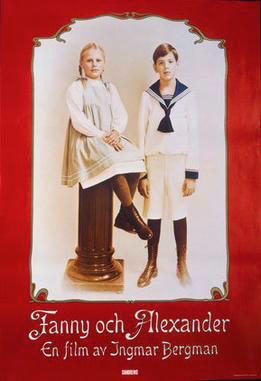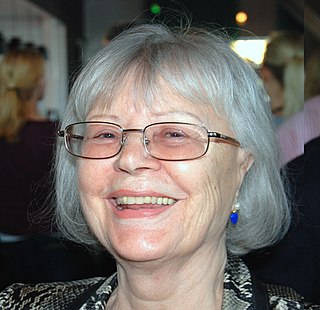Related Research Articles

Ernst Ingmar Bergman was a Swedish film director, screenwriter, producer and playwright. Widely considered one of the greatest and most influential filmmakers of all time, his films are known as "profoundly personal meditations into the myriad struggles facing the psyche and the soul." Some of his most acclaimed work includes The Seventh Seal (1957), Wild Strawberries (1957), The Virgin Spring (1960), Through a Glass Darkly (1961), Persona (1966), and Fanny and Alexander (1982).

Liv Johanne Ullmann is a Norwegian actress and film director. Recognised as one of the greatest European actresses of all time, Ullmann is known as the muse and frequent partner of filmmaker Ingmar Bergman. She acted in many of his films, including Persona (1966), Cries and Whispers (1972), Scenes from a Marriage (1973), The Passion of Anna (1969), and Autumn Sonata (1978).

Wild Strawberries is a 1957 Swedish drama film written and directed by Ingmar Bergman. The original Swedish title is Smultronstället, which literally means "the wild strawberry patch" but idiomatically signifies a hidden gem of a place, often with personal or sentimental value, and not widely known. The cast includes Victor Sjöström in his final screen performance as an old man recalling his past, as well as Bergman regulars Bibi Andersson, Ingrid Thulin, and Gunnar Björnstrand. Max von Sydow also appears in a small role.

Fanny and Alexander is a 1982 period drama film written and directed by Ingmar Bergman. The plot focuses on two siblings and their large family in Uppsala, Sweden during the first decade of the twentieth century. Following the death of the eponymous children's father, their mother remarries a prominent bishop who becomes abusive towards Alexander for his vivid imagination.

Persona is a 1966 Swedish psychological drama film, written and directed by Ingmar Bergman and starring Bibi Andersson and Liv Ullmann. The story revolves around a young nurse named Alma (Andersson) and her patient, well-known stage actress Elisabet Vogler (Ullmann), who has suddenly stopped speaking. They move to a cottage, where Alma cares for Elisabet, confides in her, and begins having trouble distinguishing herself from her patient.

Scenes from a Marriage is a 1973 Swedish television miniseries written and directed by Ingmar Bergman. Over the course of six hour-long episodes, it explores the disintegration of the marriage between Marianne, a divorce lawyer, and Johan, a psychology professor. The series spans a period of 10 years. Bergman's teleplay draws on his own experiences, including his relationship with Ullmann. It was shot on a small budget in Stockholm and Fårö in 1972.

Erland Josephson was a Swedish actor and author. He was best known by international audiences for his work in films directed by Ingmar Bergman, Andrei Tarkovsky and Theodoros Angelopoulos.

Pernilla August is a Swedish actress, director and screenwriter. Being one of Sweden's leading actresses and a longtime collaborator with director Ingmar Bergman, she won the Best Actress Award at the 1992 Cannes Film Festival for her role in his The Best Intentions. She is best known internationally for portraying Shmi Skywalker in Star Wars: Episode I – The Phantom Menace and Star Wars: Episode II – Attack of the Clones.

David Harald Vilgot Sjöman was a Swedish writer and film director. His films deal with controversial issues of social class, morality, and sexual taboos, combining the emotionally tortured characters of Ingmar Bergman with the avant garde style of the French New Wave. He is best known as the director of the films 491 (1964), I Am Curious (Yellow) (1967), and I Am Curious (Blue) (1968), which stretched the boundaries of acceptability of what could then be shown on film, deliberately treating their subjects in a provocative and explicit manner.

Harriet Andersson is a Swedish actress, best known outside Sweden for being part of director Ingmar Bergman's stock company. She often plays impulsive, working class characters.

The Magic Flute is Ingmar Bergman's 1975 film version of Mozart's opera Die Zauberflöte. It was intended as a television production and was first shown on Swedish television on 1 January 1975, but was followed by a cinema release later that year. The work is widely viewed as one of the most successful films of an opera ever made, and as an unusual item among the director's works. The film won BAFTA TV Award for Best Foreign Television Programme in 1976 and was nominated for Golden Globe for Best Foreign Language Film.
The 38th New York Film Critics Circle Awards, announced on 3 January 1973, honored the best filmmaking of 1972.
The 40th New York Film Critics Circle Awards, 26 January 1975, honored the best filmmaking of 1974.
The National Society of Film Critics Award for Best Picture is an annual award given by National Society of Film Critics to honor the best film of the year.
The 2nd National Society of Film Critics Awards, given by the National Society of Film Critics in January 1968, honored the best in film for 1967.
The 3rd National Society of Film Critics Awards, given by the National Society of Film Critics in January 1969, honored the best in film for 1968.
The 18th National Society of Film Critics Awards, given on 4 January 1984, honored the best filmmaking of 1983.
The 7th National Society of Film Critics Awards, given on 29 December 1972, honored the best filmmaking of 1972.
The 5th National Society of Film Critics Awards, given on 10 January 1971, honored the best filmmaking of 1970.
References
- ↑ "National Society of Film Critics Hails 'Scenes From a Marriage'". The New York Times. 6 January 1975. Retrieved 3 January 2018.
- ↑ "Film Critics Honor Bergman's 'Scenes From a Marriage'". Los Angeles Times. 10 January 1975. Archived from the original on 22 March 2016. Retrieved 3 January 2018.